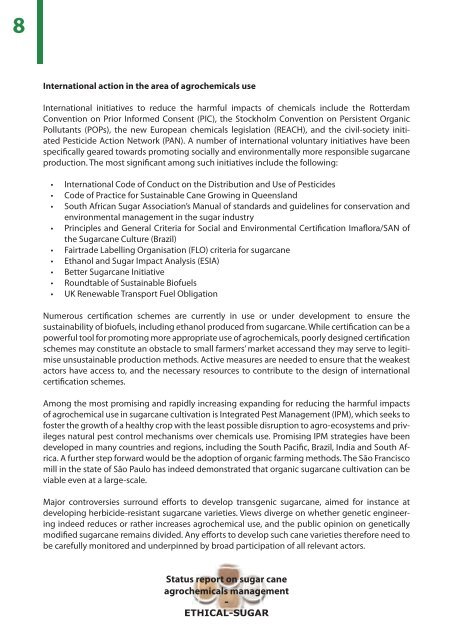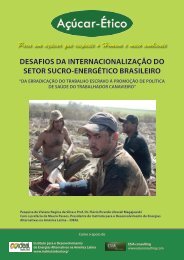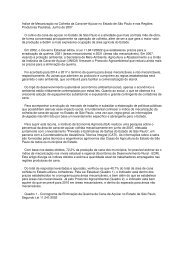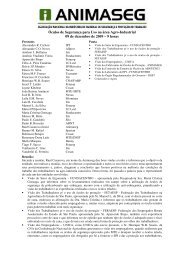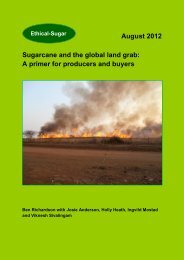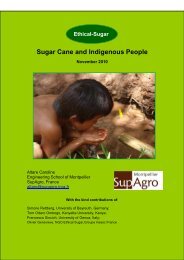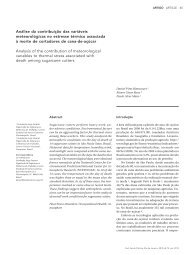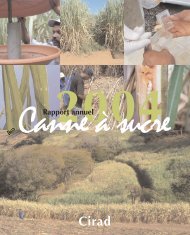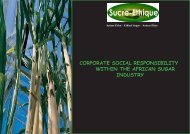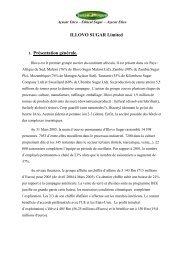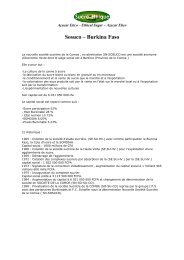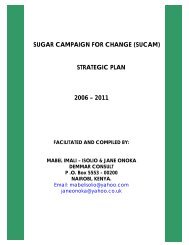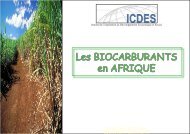Status report on sugar cane agrochemicals ... - Sucre Ethique
Status report on sugar cane agrochemicals ... - Sucre Ethique
Status report on sugar cane agrochemicals ... - Sucre Ethique
Create successful ePaper yourself
Turn your PDF publications into a flip-book with our unique Google optimized e-Paper software.
8<br />
Internati<strong>on</strong>al acti<strong>on</strong> in the area of <strong>agrochemicals</strong> use<br />
Internati<strong>on</strong>al initiatives to reduce the harmful impacts of chemicals include the Rotterdam<br />
C<strong>on</strong>venti<strong>on</strong> <strong>on</strong> Prior Informed C<strong>on</strong>sent (PIC), the Stockholm C<strong>on</strong>venti<strong>on</strong> <strong>on</strong> Persistent Organic<br />
Pollutants (POPs), the new European chemicals legislati<strong>on</strong> (REACH), and the civil-society initiated<br />
Pesticide Acti<strong>on</strong> Network (PAN). A number of internati<strong>on</strong>al voluntary initiatives have been<br />
speci� cally geared towards promoting socially and envir<strong>on</strong>mentally more resp<strong>on</strong>sible <strong>sugar</strong><strong>cane</strong><br />
producti<strong>on</strong>. The most signi� cant am<strong>on</strong>g such initiatives include the following:<br />
• Internati<strong>on</strong>al Code of C<strong>on</strong>duct <strong>on</strong> the Distributi<strong>on</strong> and Use of Pesticides<br />
• Code of Practice for Sustainable Cane Growing in Queensland<br />
• South African Sugar Associati<strong>on</strong>’s Manual of standards and guidelines for c<strong>on</strong>servati<strong>on</strong> and<br />
envir<strong>on</strong>mental management in the <strong>sugar</strong> industry<br />
• Principles and General Criteria for Social and Envir<strong>on</strong>mental Certi� cati<strong>on</strong> Ima� ora/SAN of<br />
the Sugar<strong>cane</strong> Culture (Brazil)<br />
• Fairtrade Labelling Organisati<strong>on</strong> (FLO) criteria for <strong>sugar</strong><strong>cane</strong><br />
• Ethanol and Sugar Impact Analysis (ESIA)<br />
• Better Sugar<strong>cane</strong> Initiative<br />
• Roundtable of Sustainable Biofuels<br />
• UK Renewable Transport Fuel Obligati<strong>on</strong><br />
Numerous certi� cati<strong>on</strong> schemes are currently in use or under development to ensure the<br />
sustainability of biofuels, including ethanol produced from <strong>sugar</strong><strong>cane</strong>. While certi� cati<strong>on</strong> can be a<br />
powerful tool for promoting more appropriate use of <strong>agrochemicals</strong>, poorly designed certi� cati<strong>on</strong><br />
schemes may c<strong>on</strong>stitute an obstacle to small farmers’ market accessand they may serve to legitimise<br />
unsustainable producti<strong>on</strong> methods. Active measures are needed to ensure that the weakest<br />
actors have access to, and the necessary resources to c<strong>on</strong>tribute to the design of internati<strong>on</strong>al<br />
certi� cati<strong>on</strong> schemes.<br />
Am<strong>on</strong>g the most promising and rapidly increasing expanding for reducing the harmful impacts<br />
of agrochemical use in <strong>sugar</strong><strong>cane</strong> cultivati<strong>on</strong> is Integrated Pest Management (IPM), which seeks to<br />
foster the growth of a healthy crop with the least possible disrupti<strong>on</strong> to agro-ecosystems and privileges<br />
natural pest c<strong>on</strong>trol mechanisms over chemicals use. Promising IPM strategies have been<br />
developed in many countries and regi<strong>on</strong>s, including the South Paci� c, Brazil, India and South Africa.<br />
A further step forward would be the adopti<strong>on</strong> of organic farming methods. The São Francisco<br />
mill in the state of São Paulo has indeed dem<strong>on</strong>strated that organic <strong>sugar</strong><strong>cane</strong> cultivati<strong>on</strong> can be<br />
viable even at a large-scale.<br />
Major c<strong>on</strong>troversies surround e� orts to develop transgenic <strong>sugar</strong><strong>cane</strong>, aimed for instance at<br />
developing herbicide-resistant <strong>sugar</strong><strong>cane</strong> varieties. Views diverge <strong>on</strong> whether genetic engineering<br />
indeed reduces or rather increases agrochemical use, and the public opini<strong>on</strong> <strong>on</strong> genetically<br />
modi� ed <strong>sugar</strong><strong>cane</strong> remains divided. Any e� orts to develop such <strong>cane</strong> varieties therefore need to<br />
be carefully m<strong>on</strong>itored and underpinned by broad participati<strong>on</strong> of all relevant actors.<br />
<str<strong>on</strong>g>Status</str<strong>on</strong>g> <str<strong>on</strong>g>report</str<strong>on</strong>g> <strong>on</strong> <strong>sugar</strong> <strong>cane</strong><br />
<strong>agrochemicals</strong> management<br />
-<br />
ETHICAL-SUGAR


